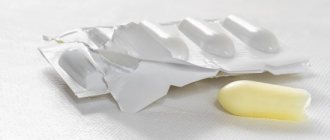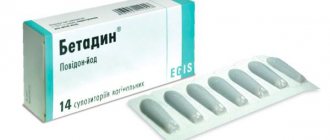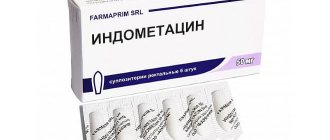- salpingitis;
oophoritis;
A gynecologist can prescribe diclofenac in the form of suppositories if a woman complains of painful menstruation
Diclofenac suppositories in gynecology: indications and instructions for use
Probably every woman at least once in her life has encountered inflammatory diseases of the genital area or pain caused by certain processes occurring in the organs of the reproductive system.
Of course, all these conditions require careful diagnosis and an integrated approach to treatment. But there are drugs that are considered “universal” in the treatment of such pathologies. These include Diclofenac.
Very often in gynecology it is prescribed in the form of suppositories.
Description of Diclofenac suppositories: composition and release forms
Diclofenac is a non-steroidal anti-inflammatory drug that has anti-edematous, analgesic and antipyretic properties. Available in several forms:
- pills;
- capsules;
- ointment;
- gel;
- injection solution;
- suppositories.
Diclofenac suppositories help to quickly eliminate pain
Varieties of the drug indicate its widespread use in all areas of medicine. In gynecology, it is very popular in the form of rectal suppositories, since the effect resulting from such use will not take long to appear.
Candles consist of:
- active ingredient: diclofenac sodium;
- auxiliary components: solid fat;
- silicon dioxide (colloid);
- propylene glycol.
Their shape is cylindrical or cone-shaped (depending on the manufacturer of the drug), color - from white to cream.
Due to the peculiar structure of the intestine (its inner lining is endowed with a huge number of tiny blood vessels - capillaries), Diclofenac is instantly absorbed into the blood, and the effect occurs quite quickly (within fifteen to twenty minutes the pain subsides).
In addition, the drug has a blood-thinning effect, which reduces the risk of blood clots and blood clots.
Indications for use: inflammation, pain and others
So, when and why can a gynecologist prescribe Diclofenac suppositories:
- if it is impossible to use other forms of the drug;
- for the rapid onset of the desired effect (this mainly concerns pain relief);
- for dysmenorrhea (painful menstruation);
- in complex therapy of inflammatory and infectious diseases of the female genital area: salpingitis;
- oophoritis;
- salpingo-oophoritis;
- polycystic ovary syndrome;
- cystic formations of the fallopian tubes and ovaries;
- adhesions in the pelvis;
- genital infections; A gynecologist can prescribe Diclofenac in the form of suppositories if a woman complains of painful menstruation
Contraindications and possible side effects
Like any medicine, Diclofenac has a number of contraindications for use:
- erosive and ulcerative changes in the walls of the gastrointestinal tract (especially for pathologies in acute stages);
- pathologies of the hematopoietic system (especially problems with blood clotting);
- individual intolerance to individual components of the drug;
- intolerance to non-steroidal anti-inflammatory drugs;
- liver and kidney diseases;
- heart failure;
- haemorrhoids;
- anal fissures;
- other proctological pathologies;
- children's age (admission under the age of 14 is not recommended).
Pregnancy and lactation are also included in the group of contraindications. But sometimes they resort to using Diclofenac during these periods. The drug is used exclusively with the permission of a doctor and only when the benefits outweigh the risks.
During pregnancy and lactation, the use of the drug is extremely undesirable, unless there are significant reasons for which Diclofenac is needed
If a woman is prescribed this drug while she is breastfeeding, the baby should be temporarily switched to an artificial formula, since the drug, spreading through the blood throughout the body, enters the milk, which can have a far from positive effect.
During treatment, you should pump daily so that the lactation process does not stop and milk stagnation (lactostasis) does not occur.
It should be noted that this should be done not only during treatment with Diclofenac, but also within three days after discontinuation of the drug so that it is completely eliminated from the body.
During therapy, a number of side effects may occur, which are relieved after discontinuation of the drug:
- allergic reactions;
- feeling of nausea;
- flatulence;
- bloating;
- burning sensation in the anus;
- diarrhea;
- constipation
How to use rectal suppositories correctly: instructions for use
There are no particular difficulties in using Diclofenac in the form of suppositories. The technique is very simple:
- before using the drug, if possible, it is necessary to cleanse the intestines for better absorption of the drug (go to the toilet, give an enema);
- Wash the hands;
- remove the candle from the shell;
- lie on your left side (leave your left leg lying straight and bend your right leg at the knee) or on your back (bend your legs at the knee joints and spread them apart);
- spread your buttocks with your hand;
- With your free hand, insert the candle with its pointed end into the rectum;
- lie down for ten to fifteen minutes.
If a woman's menstruation period is accompanied by pain, the drug should be started three days before the expected start of menstruation.
At this time, as a result of hormonal fluctuations in the body, the synthesis of prostaglandins increases. They are the cause of pain during menstruation.
Diclofenac significantly reduces the production of these substances, as a result of which menstrual periods pass much easier.
How can I replace Diclofenac suppositories?
Recently, the pharmacological industry has been producing a large number of products with a similar effect on the human body with a minimum of side effects. In addition, such drugs can be much cheaper.
Analogues of Diclofenac used in gynecology - table
| Drug name | Release form | Active substance | Indications | Contraindications | Age restrictions | average price |
| Diklak |
| diclofenac sodium |
|
|
| from 180 rubles |
| Voltaren | from 140 rubles | |||||
| Ibuprofen |
| ibuprofen |
| from 50 rubles | ||
| Nise |
| nimesulide | Can be used from the age of two | from 180 rubles |
Diclofenac analogues - photo gallery
Voltaren is a complete analogue of Diclofenac Diclak contains the same active ingredient as Diclofenac Ibuprofen is a drug from the group of non-steroidal anti-inflammatory drugs that has a gentler effect on the body.
Reviews about the use of candles
Reviews about the use of the drug are positive. Diclofenac quickly helps to get rid of pain and make you feel better.
What you need to know about the class of non-steroidal anti-inflammatory drugs - video
Despite its “versatility” and good therapeutic effect, Diclofenac has many serious contraindications. Therefore, before you start taking this drug, consult a specialist. Perhaps in your case treatment with another remedy will be indicated.
- Ekaterina Mishina
This is interesting: Inflammation of the submandibular lymph nodes - causes, diagnosis, treatment methods
Prescription of Diclofenac
The variety of gynecological pathologies requires careful diagnosis. In each specific case, the use of additional means to help relieve pain is considered. A number of reasons contribute to the choice of Diclofenac suppositories in gynecology:
- The therapeutic effect occurs an hour after administration of the suppository;
- Side effects do not cause serious consequences, which does not apply to tablets and injections. For example, tablets are absorbed into the gastrointestinal tract quite quickly. But reaching the zone of inflammation, the active substance decreases in concentration, and the action is noticeably inhibited;
- Rectal suppositories completely deliver the active substance to the disease area.
- If it happens that you cannot take other medications with Diclofenac tablets, then you can with suppositories. This is a good replacement for Diclofenac injections and tablets.
Diclofenac is one of the available medications. It is not difficult to purchase it, because it is sold in pharmacies without a doctor’s prescription. But it is wrong to carry out therapeutic therapy without first consulting a gynecologist. It is necessary to treat a specific pathology, which will be announced by the doctor based on the tests taken. A drug of any dosage form is selected for it, and the dosage is recommended.
If we are talking about suppositories, then the daily dose should not exceed 150 mg of the active substance. The doctor will focus on the contraindications of Diclofenac, making sure that you do not have concomitant pathologies for which taking Diclofenac suppositories is prohibited. Rectal suppositories are not an independent medicine that can suppress the cause of the pathology and cure it. They are used in a complex of therapeutic therapy.
Diclofenac rectal suppositories have the advantage of relieving pain in a short time. In addition, they enhance the protective function of the immune system.
Side effects of Diclofenac in the form of suppositories are less negative than in injections and tablets. It practically does not reach the liver, kidneys, or stomach. But he is not able to eliminate all side negatives. But, as we know, not all side effects occur in the patient.
The accumulation of a substance in the body during long-term use creates the likelihood of annoying sensations:
- discomfort in the intestinal tract
- burning sensation in the anus
- bloating
- bowel dysfunction such as diarrhea or constipation
- vomiting or nausea
- very unpleasant taste in the mouth
- abdominal pain
Therefore, you must follow the doctor’s recommendations regarding the duration of use of Diclofenac suppositories. The course of treatment must be effective and avoid drug overdose. Usually it is no more than 10 days. It is not recommended to combine Diclofenac with other non-steroidal anti-inflammatory drugs. If these recommendations are followed, side effects of varying strength in specific patients cannot be ruled out, based on the individual characteristics of the female body.
Diclofenac suppositories in gynecology can be used both rectally and vaginally . Under the influence of the temperature of the candle, Diclofenac dissolves quickly, and delivery of the active substance to the affected organ relieves pain. In gynecology it is used for therapeutic and prophylactic purposes.
Sometimes it is not necessary to use the entire course, for example, pain relief on critical days. A couple of days of use is enough to relieve an attack of pain. Pain relief using Diclofenac suppositories does not have a long-term effect. This respite provides an opportunity to visit a doctor to prescribe further actions:
- tests
- hardware diagnostics
- medical examination
- drug therapy in which Diclofenac can also be used
Gynecology is a sensitive topic, but very important for prolonging a full sexual life. To avoid gynecological problems, doctors recommend following the following rules:
- proper personal hygiene is the key to health
- monitoring the cleanliness of linen
- contraceptive-protected sexual intercourse
- regular visits to the gynecologist
In the early stages, gynecological pathologies have mild symptoms. But a visit to the gynecologist will not leave her unattended. Therefore, timely physiotherapy and pharmacology will help to cope with the disease quickly and without heavy artillery.
In conclusion, it should be noted that although Diclofenac is used additionally in the treatment of pathologies, its ability to relieve pain has invaluable advantages. When you shudder painfully from attacks of pain, then you think little about the negative side effects, as long as it lets go. Therefore, Diclofenac suppositories should always be kept on hand in your home medicine cabinet.
Frequent outrage on forums about the drug does not have a strict justification. Every judgment is subjective. And for some reason, satisfied people write less about the advantages than those who do not like the drug.
Sources:
Vidal : https://www.vidal.ru/drugs/diclofenak__11520 GRLS : https://grls.rosminzdrav.ru/Grls_View_v2.aspx?routingGuid=5d8a978b-56fd-4465-bfa0-907ab6103f33&t=
Found a mistake? Select it and press Ctrl + Enter
Composition and release form
Diclofenac suppositories are offered for sale in city pharmacies in dosages of:
- 100 ml;
- 50 ml;
- 25 ml.
It is allowed to consume no more than 150 ml of the drug per day, but even this norm must be pre-prescribed by the attending physician.
Uncontrolled self-medication can lead to serious health consequences:
- Allergic reaction;
- Overdose;
- Exacerbation of chronic diseases, etc.
In addition to suppositories, Diclofenac is offered in the form of:
- solution for intravenous administration;
- injections (shots);
- tablets;
- gel.
Interview with a proctologist
“I have been treating hemorrhoids for 15 years. According to statistics from the Ministry of Health, hemorrhoids can degenerate into a cancerous tumor within 2-4 years after the onset of the disease.
The main mistake is delaying! The sooner you start treating hemorrhoids, the better. There is a remedy that the Ministry of Health officially recommends.”
Composition of suppositories with diclofenac
It is allowed to consume no more than 150 ml of the drug per day, but even this norm must be pre-prescribed by the attending physician.
Uncontrolled self-medication can lead to serious health consequences:
- Allergic reaction;
- Overdose;
- Exacerbation of chronic diseases, etc.
In addition to suppositories, Diclofenac is offered in the form of:
- solution for intravenous administration;
- injections (shots);
- tablets;
- gel.
The release of diclofenac in the form of suppositories has greater advantages than other forms of release. It is suppositories that are not capable of causing complications as a result of pathology when treated with injections or tablets.
Quite often, patients encounter difficulties when treated with Diclofenac injections. As a rule, pus is formed, which subsequently leads to the formation and development of muscle necrosis. This drug is prohibited for injection use for more than two days.
Treatment with pills can also cause a lot of trouble. Cases of gastritis, ulcers and other gastrointestinal diseases have been recorded.
Suppositories are convenient to use in cases where other forms of drugs are contraindicated for the patient. Some patients pay special attention to the poor effectiveness of the drug.
To avoid wasting time and obtain exclusively positive results from treatment, you must consult a doctor to select the required dosage of the drug.
The composition of candles is a separate issue that needs to be considered. What is the reason? The composition is the basis of the medicine. In addition, not all components are tolerated by patients and this is worth thinking about.
Of course, any effect of the drug is achieved thanks to the composition of the suppositories. After all, the composition is the basis that influences the course of treatment and the state of human health.
The composition of such a drug is quite modest, but the complex of such components suggests that the effectiveness of the suppositories is truly justified. After all, the composition of these candles is based on various components.
Diclofenac is not the only component included in the composition.
Diclofenac contains the following components:
- solid fat;
- silica;
- miglyol 812.
First of all, this composition helps to provide these suppositories not only with various types of anti-inflammatory effects, but at the same time the drug has antipyretic properties that help relieve and get rid of spasms.
After all, spasm is a common phenomenon that most patients experience. Thanks to this composition, you can quickly get rid of various inflammatory processes running in the human body and increase heat transfer, as well as get rid of pain symptoms.
In comparison with other forms of diclofenac, suppositories, that is, suppositories, are most suitable for pain relief and inflammation in the genital area:
- Diclofenac gel or ointment does not provide sufficient penetration of the active substance to the internal organs.
- Diclofenac tablets do not enter the body quickly enough. It takes 2–4 hours to be absorbed. Taking the drug through the stomach is associated with negative effects on the mucous membrane and other side effects.
- The fastest and most effective way to use diclofenac is by injection. But it is inconvenient in everyday life, requires skills, and is not always justified in case of local inflammation.
- In the form of suppositories, diclofenac has a maximum effect directly on the lesion an hour after insertion of the suppository. In gynecology, rapid effect and localization are very important.
Suppositories are produced in a cylindrical form that is convenient for insertion into the rectum. The content of diclofenac sodium in them, depending on the prescribed dose, is 25 mg, 50 mg or 100 mg.
Propylene glycol, silicon dioxide colloid and solid fat are present as auxiliary ingredients. It is designed to retain its shape in room conditions, and inside the body it gradually softens and promotes the absorption of the drug into the intestinal walls.
To calculate the dose of Diclofenac you need to consider:
- the severity of inflammation and the causes that caused it;
- a woman's individual menstrual cycle;
- using other medications at the same time;
- age, body condition, weight - for elderly women or those weakened by illness, who have a low body weight, diclofenac is prescribed with caution, in minimal doses;
- if the drug is prescribed simultaneously in different forms, its daily amount must be taken into account;
- daily consumption of diclofenac should not exceed 150 mg;
- The duration of the entire course is no more than 10 days.
When using diclofenac in suppositories, doctors recommend adhering to the following rules:
- Administer suppositories once a day as prescribed by your doctor.
- Empty your bowels before the procedure. This can be done naturally or by washing.
- You need to insert the candle with the sharp end, as deep as possible. To make this easier, you can squat or bend over.
- After inserting the suppository, you must lie down for at least 2 hours. Therefore, it is preferable to administer it at bedtime.
Mechanism of action of Diclofenac
This drug belongs to the non-steroidal group; the properties of the drug include pain relief.
Due to the powerful composition, arachidonic acid is destroyed and the level of synthesis in the mucous membrane and kidneys is reduced.
This drug is most effective for inflammation and rheumatic diseases. Diclofenac helps reduce painful and uncomfortable sensations, morning pain, and relieve swelling.
Suppositories are used in gynecology to eliminate swelling and inflammation of the genital organs; the drug eliminates itching and burning. In therapy, the drug has virtually no effect during the period of bleeding.
The advantage of the drug is that even with prolonged use, the drug does not lose its analgesic properties.
Useful properties of Diclofenac for inflammation of the appendages
Diclofenac exhibits many beneficial properties for inflammation of the appendages and normalizes the functioning of the affected organs; it has the following effects:
- anti-inflammatory;
- analgesic;
- hypothermic;
- decongestant.
Under the influence of Diclofenac, the severity of the inflammatory reaction in the ovaries is reduced, fibrosis and tissue scarring are reduced during a long course of the disease.
Compound
The drug contains the active substance diclofenac sodium. It is a derivative of phenylacetic acid. When treating inflammation of the appendages, tablets, suppositories and a solution for intramuscular administration are used. The auxiliary components of these forms differ.
| Dosage form | Description | Auxiliary components |
| Pills | Round, white, 25 mg per 1 tablet of active substance |
|
| Rectal suppositories | White with a creamy tint, 5 pieces per package, each candle contains 100 mg of diclofenac | Solid fat |
| Solution | In 1 ml of solution 25 mg of diclofenac, a clear solution with a faint odor of benzyl alcohol in ampoules of 3 ml |
|
pharmachologic effect
The mechanism of action of diclofenac is associated with the suppression of the activity of an enzyme involved in the metabolism of the main inflammatory mediators - cyclooxygenase. With a decrease in its activity, the rate of migration of inflammatory cells, exudation in the area of inflammation, as well as the concentration of leukotrienes and interleukins, which enhance the inflammatory response, decrease.
The condition of the vascular wall and intercellular space is normalized. Microcirculation and venous outflow improves, which helps reduce pain and fever. Platelet aggregation is suppressed, which improves blood circulation in the ovarian area.
Mechanism of action of Diclofenac
When taken orally, the drug is well absorbed. Eating at the same time slows down the process, but does not interfere with the flow of the medicine. 50% of the drug is metabolized during the first passage through the liver. Most of the drug (99%) binds to proteins, which makes it difficult to remove the drug in the event of an overdose.
When used rectally, absorption occurs more slowly. Maximum concentrations are achieved 2-4 hours after oral administration, 1 hour after rectal use and 20 minutes when injected into a muscle. Concentration in plasma is directly dependent on the dose.
The drug does not accumulate in the body and penetrates well into the joint fluid. Most of the drug is excreted as soluble compounds through the kidneys in the urine. The medication is completely removed from the body after 2-4 hours from plasma and 6-12 hours from synovial fluid.
Indications for use
Diclofenac is used to relieve pain and reduce the degree of inflammation during an infectious process in the appendage area. The drug is also used to relieve tissue swelling and lower body temperature.
Inflammation of the uterine appendages
Main characteristics of Diclofenac suppositories
Diclofenac suppositories are a drug that has analgesic properties, as well as mild anti-inflammatory and antipyretic properties.
| Characteristics of the drug | Short description |
| Release form | Rectal suppositories, each packaged separately. Connected together in a blister of 5 pieces |
| Concentration of active substance | 50 or 100 mg |
| Main manufacturers | "Ratiopharm", "Altpharm", "MFF" and others |
| Weight of one candle | About 2 g |
| Storage conditions | In a cool room, avoiding direct sunlight on the packaging |
| Expiration dates | 3 years from date of issue |
Compound
The suppositories contain the only active ingredient - diclofenac sodium, the content of which in one suppository can be 50 or 100 mg. It has a pronounced analgesic effect and also reduces/stops inflammation. Additional components include:
- Witepsol H15 is a solid fat, which is the basis for making candles;
- colloidal silicon dioxide – “works” as an enterosorbent;
- Miglione 812 is a solvent that promotes complete and rapid absorption of the main active ingredient.
Prescription for the drug
A prescription is not required to purchase the drug - Diclofenac suppositories are freely available. But at the same time, experts insist on their use only as prescribed by the attending physician.
How they work
The candles act in a complex way:
- relieve, make tissue inflammation less pronounced;
- do not have an intense antispasmodic effect;
- provide blood thinning and accelerate blood flow;
- lower body temperature;
- relieve pain (very quickly, the desired effect is achieved literally 1-3 minutes after administration of the suppository);
- reduce the severity of swelling of inflamed tissues.
The main effect of Diclofenac in suppositories is to suppress the synthesis of substances that provoke the progression of the inflammatory process.
How long does it take to work?
Depending on where the source of pain is located, the suppositories begin to act within 30-60 minutes. If they are used to relieve pain in the rectum (for example, with the progression of hemorrhoids), then a decrease in the severity of pain occurs almost immediately after the administration of the suppository.
The resulting effect lasts on average for up to 8 hours, sometimes the patient notes relief for 12 hours.
Which is better - injections or suppositories?
It is impossible to answer unequivocally what is better to use - injections or Diclofenac suppositories, because everything depends on the developing pathology and the location of the problem area. For example, if there is pain in the lower back or muscles of the cervical spine, then it is advisable to perform injections. And for gynecological diseases, during the treatment of diseases of the rectum, suppositories will be appropriate.
Indications for use
A very long time ago, this type of drug was developed specifically for the treatment of the etiology of rheumatism, but over time, it began to be widely used in various medical fields.
Diclofenac is also known as a good pain reliever.
And recently, Diclofenac has been used to suppress tumor growth.
The use of the product is relevant in the following cases:
- Various pathologies of the musculoskeletal system. For example: arthritis, osteochondrosis, gout, bursitis, osteoarthritis, tenosynovitis, ankylosing spondylitis.
- Neurological pain. Usually, injections are prescribed for intramuscular administration or ointments for external use, for example, Voltaren ointment.
- Pain syndrome in the spine.
- Lumbago.
- Headache.
- Toothache.
- Diseases of the ENT organs, especially if the pain is unbearable. For example: otitis media or pharyngitis.
- Pain after surgery.
The doctor prescribes a form of the drug suitable for a specific disease. He also prescribes the daily dose and regimen of use, while the doctor takes into account the patient’s age, diagnosis and duration of the disease.
According to the instructions, the daily dose should not exceed 150 mg.
If you increase the dose on your own, the pain will not go away faster, but it is quite easy to cause an overdose:
- Vomit.
- Nausea.
- Pain syndrome in the abdominal area.
- High or low blood pressure.
Useful qualities of Diclofenac
Diclofenac has the following release forms:
- injections
- pills
- suppository
- ointment, gel
- drops
Taking the drug has an effective and rapid effect, removing:
- pain of various nature
- heat
- chills
Relief of pain even from a small dose of Diclofenac makes it famous as one of the best medicines in its class. Rectal suppositories are common in gynecology due to the effects of:
- antiaggregation
- antispasmodic
- antipyretic
- anti-inflammatory
- candles remove puffiness and increase heat transfer
For problems related to gynecology, Diclofenac suppositories can be compared to an ambulance. A sudden pain that takes you by surprise can be relieved with one candle.
This is interesting: 2 leading methods of treating atherosclerotic cardiosclerosis
Gynecological pathologies treated by Diclofenac
In gynecology, for inflammation, Diclofenac can be used if necessary:
- relieve menstrual pain – dysmenorrhea
- treat inflammation of the ovaries - adnexitis
- for ovarian and fallopian tube cysts, diseases of the uterus, vagina, and pelvic organs
- rehabilitation after an abortion or miscarriage
- danger of formation of adhesions of appendages
- pain after surgery or childbirth
The absence of contraindications for use in women will allow Diclofenac suppositories to cope with inflammation and relieve pain.
Possibility of using suppositories in gynecology:
- A common gynecological disease in women is inflammation of the appendages. The term appendages includes the ovaries, fallopian tubes, and the ligaments that support these organs. The danger of neglect of the inflammatory process is complications, among which the worst is infertility. An acute process can develop into a chronic form, the fight against which is much more difficult. Diclofenac for inflammation of the appendages is prescribed as additional therapy. The main treatment is antibiotics;
- Critical days sometimes create unbearable pain, reducing the quality of life. Pain relief pills do not always work. Diclofenac suppositories inserted into the rectum will relieve pain and provide an anti-inflammatory effect. Typically, pathologies of the genital organs tend to worsen during menstrual periods;
- Follicular cyst is a common occurrence among neoplasms in gynecology. It grows from follicles that have failed to ovulate. The causes may be inflammatory and infectious pathologies of the reproductive system. Therefore, in gynecology, Diclofenac suppositories are used for anti-inflammatory therapy;
- Diclofenac suppositories are prescribed after abortions and miscarriages to reduce the risk of infection and inflammation;
- A common problem that creates pain in gynecology is the appearance of adhesions. They are the brainchild of connective tissue. The use of Diclofenac suppositories prevents this process;
- Relieving pain is the direct purpose of Diclofenac suppositories. These pains can be of any etiology.
Contraindications for use:
- rectal ailments or hemorrhoids
- anal bleeding
- pathology of the stomach or intestines in the form of ulcers
- intolerance to the active substance diclofenac
- children under 12 years old
- pregnancy and breastfeeding
- kidney pathology
Reviews of Diclofenac
When reading reviews about Diclofenac, you can come across both positive and negative reviews. Basically, the drug copes remarkably well with pain and relieves inflammation, but provided that the instructions have been read and followed according to all the rules.
However, according to reviews, you can often find that the product causes problems with the gastrointestinal tract, so each one is individual. Until you try it yourself, you won’t be able to form your own opinion.
Perhaps by taking additional stomach enzymes during treatment, this fate can be avoided. But this is more of a personal opinion, everything should be prescribed by a doctor, and you should clarify all the details yourself.
Correct rectal application
The instructions for using Diclofenac in gynecology are quite detailed and accessible. But the dryness of common truths gives rise to a desire to once again recall some of the subtleties of using the drug.
Diclofenac rectal suppositories are a means of systemic use. They are quickly absorbed into the circulatory system through the intestinal walls. Rules of application:
- Before insertion, it is necessary to empty the intestines;
- Wash your hands with soap;
- Hands should be cold so that the suppository does not melt;
- You can select any input position. But the anus should be relaxed. It is not allowed to use force to administer medication. The result of this action may be damage to the mucous membrane of the anus. To facilitate insertion, creams, Vaseline, and glycerin are used;
- Insertion occurs with the sharp end of the candle; you can also lubricate the tip with oily products. The procedure must be performed quickly so that the candle does not have time to melt. The suppository should go as deep as possible;
- The procedure time is at night. If it is administered twice a day, then you must lie down for about 30 minutes.
When are Diclofenac suppositories needed for adnexitis?
For adnexitis, Diclofenac suppositories are in most cases preferable to other forms. This form of the drug allows you to deliver the medicine to the site of the lesion due to the anatomical proximity of the rectum and genital organs. The local anti-inflammatory effect is more pronounced.
However, this method is less indicated for extensive inflammation, when systemic use of the drug in the form of tablets or injections is required.
Rectal suppositories are used if there is no inflammation of the rectum and bleeding from it, as well as trophic changes in this area. Suppositories are well suited for pregnant and weakened patients due to the low risk of side effects.
Advantages of use
Rectal use has its advantages:
- less risk of side effects;
- better penetration into the lesion;
- average speed of onset of effect;
- rapid absorption of substances from the mucosal surface;
- reduction of perifocal inflammation;
- better tolerability of therapy.
Negative sides
Candles also have their disadvantages:
- need for rectal administration;
- not suitable for severe inflammation and pain;
- restrictions for inflammatory and hemorrhagic lesions of the rectum;
- smaller dosage range;
- slower effect;
- less adherence to treatment.
Watch this video for instructions on how to use Diclofenac (tablets and suppositories):
Storage conditions and shelf life
The price of Diclofenac suppositories may vary depending on the city and the pharmacy chain where the drug is purchased. On average, a package of 10 100 mg suppositories will cost 233 rubles, if it is made in Germany. A package with the same number of candles and the same dosage, but made in Russia, will cost 56 rubles, which is almost 5 times cheaper.
Although domestically produced drugs are cheaper, preference is still given to imported ones due to their higher quality and effectiveness. But here everyone decides for himself what suits him best. It is better, before purchasing, to consult with your doctor and find out which drug to choose and how to take it in order to get the desired result and minimize possible side effects.
Diclofenac suppositories are available from pharmacies with a doctor's prescription.
Diclofenac suppositories are valid for three years from the release date indicated on the package. After the expiration date, the drug is not used and must be disposed of.
Diclofenac suppositories should be stored away from children, at a temperature of 15 to 25 degrees, away from moisture and direct sunlight.
All information about the drug Diclofenac is for informational purposes only. The drug is prescribed by a doctor; before use, you must carefully study the instructions.
There are contraindications, it is necessary to consult a specialist.
Interaction with other drugs
Treatment without the supervision of a doctor is very risky, therefore, before using the drug, it is possible only after consultation with a gynecologist or proctologist (depending on the location of the disease).
Therefore, it is very important to take medications carefully:
- Diclofenac suppositories should be taken with caution together with drugs that are highly hepatoxic. Diclofenac suppositories should be taken carefully with drugs that are highly hepatoxic. These drugs primarily include antibiotics and drugs used to treat epilepsy.
- Plasma concentration increases in the blood when taking drugs such as: Methotrexate;
Contraindications and side effects
Despite the fact that the drug quickly and effectively eliminates health problems, it has several important contraindications that should never be neglected:
- Pathologies of the rectum;
- Bleeding from the anus;
- Stomach ulcer;
- Intolerance to the active component;
- Pregnancy, lactation;
- Diseases of the cardiovascular system;
- After coronary artery bypass surgery;
- Crohn's disease;
- Inflammation and acute intestinal diseases;
- Incoagulability of blood;
- Erosion of the gastric mucosa;
- Duodenal ulcers;
- Gastrointestinal bleeding;
- Suppression of bone marrow bleeding;
- High blood pressure;
- Kidney dysfunction;
- Proctitis.
In addition, Diclofenac is not recommended for use by children under 6 years of age; elderly patients should not take suppositories. Its use is possible only according to the instructions and prescription of a doctor, under his supervision.
In case of an allergic reaction or intolerance, use of the drug may cause the development of bronchial asthma.
Under no circumstances should you take the drug if you have recurrent sinus polyposis or develop intolerance to acetylsalicylic acid.
You need to be very careful when taking the drug if you have:
- Diabetes mellitus;
- Peripheral arterial dysfunction;
- Ulcerative lesions of the gastrointestinal tract;
- Excessive alcohol consumption, smoking.
You should also be extremely careful when using Diclofenac if you are simultaneously receiving therapy with anticoagulants, antiplatelet agents, glucocorticoids and inhibitory drugs.
Who should not be given Diclofenac injections in gynecology
In gynecology, Diclofenac injections cannot be given if you have:
- uterine bleeding;
- active gastrointestinal bleeding;
- bronchial asthma and polyposis of the paranasal sinuses;
- intolerance to acetylsalicylic acid or other non-steroidal anti-inflammatory drugs;
- inflammatory bowel diseases;
- erosive and ulcerative lesions of the gastrointestinal tract;
- severe cardiac, renal and liver failure;
- progressive kidney disease;
- period after coronary artery bypass surgery;
- third trimester of pregnancy and lactation period;
- hypersensitivity to additional components;
- proctitis and bleeding from hemorrhoids (for suppositories).
Polyposis of the paranasal sinuses
Great caution is required when prescribing diclofenac for the following conditions:
- weakened patients with low body weight;
- arterial hypertension;
- chronic cardiovascular failure;
- history of liver disease;
- cardiac ischemia;
- diabetes;
- bronchial asthma;
- prescription of anticoagulants, antiplatelet agents, selective serotonin reuptake inhibitors, and other NSAIDs;
- prolapse of the rectum and vagina.
Diclofenac - what is it?
Diclofenac, rectal suppositories - a drug from the group of non-steroidal anti-inflammatory drugs. The product has a pronounced anti-inflammatory property, reduces pain, therefore it is widely used in medicine. The range of diseases for which Diclofenac can be used is wide. In this case, the drug is used both as a primary and in the form of an additional agent. White, sometimes with a yellowish tint, Diclofenac suppositories are easy to use and easy to dose, and are often used in medical practice.
Diclofenac suppositories - composition
Diclofenac suppositories are capsule-shaped. This facilitates their use and ensures easy insertion into the rectal cavity. The active ingredient of the drug is diclofenac sodium. Depending on the dosage, its concentration in the drug is 50 or 100 mg (taken into account when prescribing).
In addition to the main component, the preparation also contains additional substances: cetyl alcohol, semi-synthetic glycerides. They ensure rapid dissolution of suppositories inside the rectum and release of the active ingredient. This simple form of Diclofenac and the composition of the drug provide a small number of contraindications and side effects.
What does Diclofenac help with?
The mechanism of action of the drug is based on the rapid inhibition of the COX enzyme. This substance is a product of the metabolism of arachidonic acid, from which prostaglandins are later formed. These substances play an important role in the development of an inflammatory response in the body, accompanied by pain and inflammation. The analgesic effect is due to two mechanisms:
- Peripheral
- through suppression of prostaglandin synthesis. - Central
– inhibition of prostaglandin formation in the central and peripheral nervous system.
Based on these properties of the drug, we can say that Diclofenac treats almost all diseases that are based on an inflammatory process. The remedy can be effective in cases of development of pain syndromes and fever. In complex treatment, the medicine is also used for severe hyperthermia during acute infectious diseases.
Composition of the drug and its effect
The history of the creation of Diclofenac goes back to the distant 60s. This medication was developed as an analogue of aspirin, an improved non-steroidal anti-inflammatory drug. It is produced in different medicinal forms.
In gynecology, Diclofenac is recommended for use in the form of rectal suppositories, due to the absence of many side effects associated with passage through the gastrointestinal tract. Quite often they are prescribed in parallel with antibiotics, in this way the course of treatment is much shorter.
The active substance of the suppositories is sodium diclofenac, which provides a multifunctional effect on the body. An undoubted advantage of suppositories is their high absorption rate of diclofenac sodium; after about 30 minutes, half of it enters the bloodstream.
How the product works:
- Suppresses the active substance responsible for the metabolism of arachidonic acid, which in turn causes fever and fever.
- Inhibits the synthesis of prostaglandins, which cause pain in the body.
- Reduces the likelihood of blood clots.
- Stops the release of arachidonic acid, which provokes the occurrence of the inflammatory process.
In appearance, candles resemble a cylinder or cone.
The color range has different shades depending on additional substances:
- White.
- Cream.
- Yellow.
- Light yellow.
The suppository contains 50 or 100 mg of diclofenac sodium plus auxiliary components:
- propylene glycol;
- colloidal silicon dioxide (Aerosil);
- hard fat.
Diclofenac contains a lot of fat, but, nevertheless, candles are able to retain their original appearance until the moment when they enter the human body and there they begin to gradually soften from human warmth.
Instructions for use
Rectal suppositories are a means of systemic use. This is due to the fact that drugs enter the bloodstream more easily and quickly through the intestinal walls. The greatest effectiveness is achieved when using the drug immediately before bedtime. It is necessary to lie on your back, and after administering the suppository it is not recommended to get up for 2 hours. Can be used twice a day. The duration of the course of therapy is no more than 10 days.
Is it possible to use Diclofenac for inflammation of the ovaries in pregnant women?
During pregnancy, a priori, there cannot be inflammation of the ovaries, and during pregnancy, Diclofenac can be used to suppress inflammation in other organs and is often prescribed in the first and second trimester of pregnancy.
In the third trimester, the use of the drug can negatively affect the pregnant woman and the fetus, so you should try a different medicine or change the approach to treatment.
After cesarean
To relieve pain after cesarean section or in case of adnexitis development after surgery, anti-inflammatory therapy with Diclofenac is used. You can start therapy with injections for 2-3 days to achieve a better initial therapeutic effect, and then switch to taking tablets orally.
If a woman maintains lactation, then it is better to refrain from feeding the baby and simply express milk. The course of treatment averages 10-14 days.
In childhood
In childhood, there are restrictions on dosage forms and dosages.
| Form | Mode of use |
| Pills |
|
| Candles | Children over 14 years old: 1 suppository of 50 mg up to 2 times a day |
| Solution | Intramuscular injections are not used until the age of 18 |
Suppositories for hemorrhoids
Many patients wonder how effective is the use of Diclofenac suppositories for hemorrhoids? Experts do not recommend using this drug ; there are more effective medications with fewer side effects.
For acute hemorrhoids, this remedy is strictly prohibited. Otherwise, the course of the disease may be seriously aggravated by bleeding and severe pain.
The drug "Diclofenac" can be used for the development of hemorrhoidal cones only on those areas of the skin that are not damaged by cracks or bleeding.
The use must be carried out exclusively as prescribed and under the supervision of a physician; the course must also be prescribed by a specialist.
The drug "Diclofenac" with long-term use can cause addiction and serious aggravation.
Important! Diclofenac suppositories and ointments are intended exclusively for external use and cannot be used orally.
Diclofenac suppositories - contraindications and side effects
Each case of the disease is individual, so only a doctor should determine whether Diclofenac can be used for a specific pathology. Doctors pay attention to the type of disease, its clinical picture and the patient’s condition. In this case, the presence of concomitant pathologies that may limit the use of anti-inflammatory drugs must be taken into account. Special attention is paid to contraindications and side effects, neglect of which may affect the patient's condition.
Diclofenac suppositories - contraindications
Even if there are indications, the drug cannot be used in all cases. Diclofenac in the form of suppositories is not used during pregnancy, but in exceptional cases, according to the doctor’s decision, it is used.
Doctors always assess the patient’s condition, the type of disease and the nature of the clinical picture before using Diclofenac suppositories, the contraindications for use of which are as follows:
- blood pathologies of unknown origin;
- stomach ulcer;
- inflammatory bowel diseases of a destructive nature in the acute phase;
- period of pregnancy and lactation
- age less than 12 years;
- increased sensitivity of the body to acetylsalicylic acid and diclofenac;
- proctitis
Diclofenac suppositories - side effects
When patients use Diclofenac suppositories correctly, according to the instructions and prescriptions of the doctor, side effects are practically minimized.
However, it is worth noting that this factor directly depends on:
- individual sensitivity of the body;
- the therapeutic dose used;
- duration of medication use.
According to the observations of specialists, in most cases, patients who used Diclofenac suppositories encountered the following complaints about the drug:
- from the digestive system:
vomiting, nausea, stomach pain, constipation, flatulence; - from the urinary system:
nephritis in interstitial form; - from the central nervous system:
dizziness, headaches, insomnia, spatial disorientation, fatigue; - disorders of the hematopoietic system:
thrombocytopenia, leukopenia, agranulocytosis; - skin reactions:
erythema, exanthema, hyperemia.
Description of Diclofenac suppositories
Diclofenac is a non-steroidal anti-inflammatory drug with analgesic and antipyretic effects.
Diclofenac suppositories are a non-steroidal drug that acts directly on the site of inflammation without affecting healthy tissue.
The product was first released in 1966. It was initially developed for the treatment of rheumatoid diseases, but the effect so impressed doctors that the scope of its application was expanded.
The main active ingredient is diclofenac sodium, which has the following effects on the body:
- anti-inflammatory;
- analgesic;
- decongestant;
- antipyretic.
The mechanism of action is due to the suppression of prostaglandins - biologically active substances that play a significant role in many processes in the human body, including the development of inflammation. Thanks to this, swelling is reduced and pain is reduced. One suppository contains from 25 to 100 mg of diclofenac.
Solid fat is used as the basis for suppositories, which quickly dissolves in the vagina and the medicine immediately reaches the site of inflammation. The use of the drug from the very beginning of the disease does not allow it to become chronic.
Drug interactions
It is prohibited to use Diclofenac suppositories in combination with other medications without the consent of your doctor. Such “complex” therapy can give an unexpected effect:
- with digoxin and lithium - these substances are detected in the blood after 5 days of administration;
- with diuretics and blood pressure lowering drugs – they stop providing the proper therapeutic effect;
- with cyclosporine - a toxic “blow” occurs to the kidneys;
- with non-steroidal or glucocorticosteroid drugs - the adverse reaction to them increases significantly;
- with anticoagulants – the risk of internal bleeding becomes maximum;
- with Methotrexate - it becomes a toxin for the body, poisoning occurs.
You cannot use suppositories and take hypoglycemic drugs at the same time - the latter have too pronounced an effect, the patient may fall into a coma. If, in parallel with suppositories, the patient takes antibacterial drugs from the quinolone category, then convulsions of the lower or upper extremities are possible.
What can replace the product?
If for some reason Diclofenac suppositories cannot be used, the doctor may recommend replacing them with a product with a similar effect.
Diclofenac analogues - table
| Name | Release form | Active substance | Indications | Contraindications | Age | price, rub. |
| Voltaren |
| Diclofenac sodium |
|
| From 6 years old | 173 |
| Indomethacin |
| Indomethacin |
|
| From 10 years old | 40 |
| Ibuprofen | Pills | Ibuprofen | Infectious and inflammatory diseases of the female genital organs. |
| from 6 years old | 15 |
| Ketonal |
| Ketoprofen |
|
| From 14 years old | 90 |
Replacement drugs in the photo
Feedback on using the product
Inna85
DETAILS: Suppositories for prostatitis: effective, inexpensive, list
Regarding Diclofenac suppositories, as an effective analgesic and anti-inflammatory agent in gynecology, reviews are mostly positive. But, as both experts and patients note, it is imperative to take precautions, not to self-medicate, and not to exceed the dosage (supposedly to make it work faster).
Olga Krivoshey, gynecologist: “In the treatment of gynecological diseases, I often have to prescribe all kinds of rectal and vaginal suppositories, since this particular pharmaceutical form is more convenient. I recommend diclofenac during the postpartum period, during menopause, and for painful periods. Women can have the drug in their home medicine cabinet in reserve, but it is better to check with your doctor about the possibility of using it before purchasing.”
Galina Golub, 44 years old: “I use suppositories regularly. On the first day of menstruation - like a bayonet. This allows you to better postpone the entire period.”
Svetlana Zhirova, 56 years old: “Suppositories were also prescribed in the course of treatment for inflammation of the appendages. After the first use, the pain in the lower abdomen weakened, and after 14 days it did not arise at all. Diclofenac was personally useful to me as a targeted painkiller.”
Yulia Alexandrova, 27 years old: “I used rectal suppositories in postoperative rehabilitation at home (injections were given in the hospital). The drug relieves pain well, fights inflammation, and acts as an antipyretic. By strictly adhering to the prescribed course, I was able to restore my body normally.”
Despite the positive effect of using the product, it is still worthwhile to study the sections of contraindications, restrictions on use, and side effects in the instructions. Among the contraindications and conditions of limited use of the drug, there are, of course, periods of gestation and lactation, and individual sensitivity to substances.
Overdose
In Diclofenac suppositories and ointment, the concentration of the active substance is very low, so there are practically no cases of overdose.
In rare cases of incorrect combination of drugs or individual intolerance, side effects of overdose are possible, such as:
- Nausea,
- Vomit,
- Bleeding in the abdominal cavity,
- Migraine,
- Diarrhea,
- Cramps,
- Dizziness, fainting,
- Noise in ears,
- Kidney failure
- Acute pain in the abdomen.
Treatment for overdose is aimed at eliminating symptoms.










